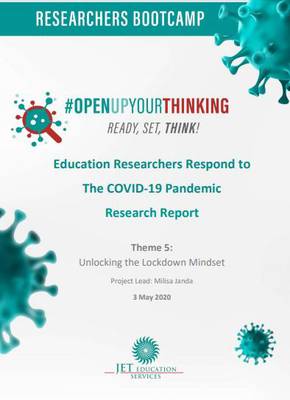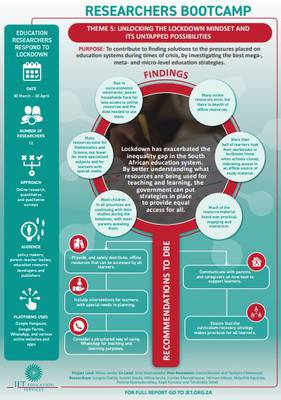Theme 5: Unlocking the Lockdown mindset and its untapped possibilities
Peer reviewer: Sebolelo Nomvete, merSETA
Researchers: Lungelo Dakile, Somila Dayile, Milisa Janda, Harries Mampenyane, Herman Meyer, Nhlanhla Ngulube, Pertina Nyamukondiwa, Kapil Ramisur and Tsholofelo Setati
Download the final report and infographic
|
Download the research report for theme 5
|
View the infographic for theme 5
|
BACKGROUND
With the country and the world at large currently grappling with COVID-19, the DBE has noted the following:
“In accordance with the pronouncement by the President on 15 March 2020, schools will be closed from 18 March 2020 and will reopen on 14 April 2020. This decision has been informed by the warnings provided by the National Institution of Communicable Diseases and World Health Organisation who have highlighted the alarming increase of infections within the country over a three day period. Schools have thus been identified as high risk areas that could spread the infections easily.” (DBE, 2020).
It is against this background that there is a need to embark on a research project which investigates and assesses the best mega-, meta- and micro-level educational strategies to be used during times of crisis. One of the six thematic areas that the research focuses on is unlocking the lockdown mindset and its untapped possibilities in education.
DEFINING THE OLD AND THE NEW NORMAL
As a result of the proclamation on the state of disaster in South Africa, teaching and learning cannot continue in the conventional way and can no longer be in the form of an academic programme that takes place in a physical classroom led by the teacher. If teaching and learning cannot continue in the conventional way, however, it means that there will be a loss of teaching and learning days. A new normal needs to be established to ensure that children continue to learn and develop intellectually, mentally, emotionally, socially and physically. A new normal thus entails finding ways of ensuring that effective teaching and learning takes place through an academic programme that does not take place in the physical classroom.
PROBLEM STATEMENT
Schools have been identified as high risk areas that could spread infections easily and thus the traditional model of schooling is currently hampered because of the COVID-19 pandemic and the risk it poses.
Objectives of the research
- To understand what teaching and learning resources currently exist.
- To curate available teaching and learning resources and present them in a meaningful way for teachers, learners and parents to use.
Outputs of the research
- Curated resources for learners, parents and teachers
- What teachers can do to assist learners during lockdown?
- Parents becoming the teacher during lockdown
Theory of change
IF relevant and accessible teaching and learning resources are found and curated, THEN teachers, learners and parents will be exposed to relevant teaching and learning resources; And IF teachers, learners and parents are provided with the curated teaching and learning resources that can be used effectively outside of the traditional schooling model, THEN parents will play an important role in their children’s schooling thus minimising disruption to children’s schooling
Research question
How can the old normal be turned into the new normal and impact positively on education?
Research approach
An assessment of teaching and learning materials currently available for teachers, learners and parents in South Africa for use during the lockdown.



